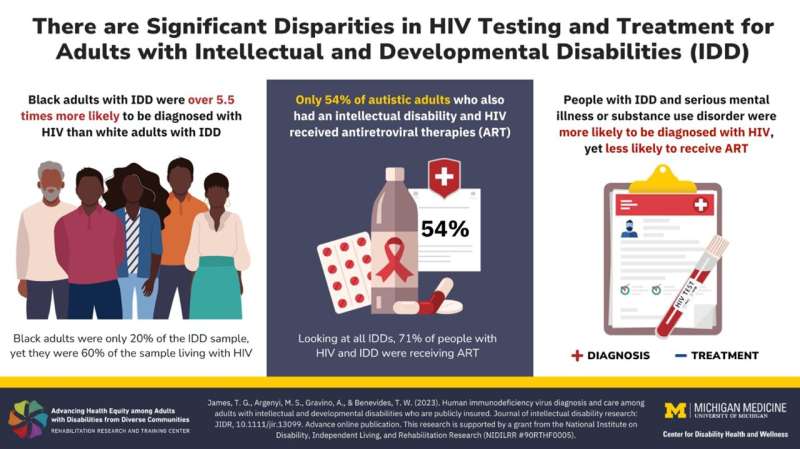
Disparities in HIV testing for people with intellectual disabilities are becoming a common challenge. Photo by TG James, Department of Family Medicine, University of Michigan, Ann Arbor, Michigan, USA
People with disabilities are often at higher risk of HIV infection due to barriers to accessing health care and other institutional factors and are therefore considered priority targets for prevention and testing efforts. However, these efforts do not always reach people with intellectual disabilities due to the perception that most of them are asexual.
Researchers at the University of Michigan Health School conducted the largest epidemiological study of people with intellectual and developmental disabilities to delve into HIV treatment gaps and found large disparities in care for black patients and those with autism and intellectual disabilities.
People with autism and intellectual disabilities, and black people with intellectual and developmental disabilities, were tested for HIV less frequently, had disparate access to HIV-related treatment, and generally had poorer care outcomes.
“There’s a big misconception that patients with intellectual disabilities are asexual and therefore don’t need HIV testing or education,” said Dr. Tyler G. James, assistant professor of family medicine at the University of Michigan Medical School and lead author of the study published in the Journal of Intellectual Disability Research.
“This is not the case, and not providing adequate treatment to this population will lead to an increase in HIV cases and the spread of HIV.”
Of those with intellectual disabilities and HIV, 59% are black, even though black people make up only 21% of the population with intellectual and developmental disabilities.
The study found that 71% of people living with HIV and intellectual disabilities were receiving antiretroviral therapy, consistent with global estimates in the general population.
However, only 54% of autistic adults with intellectual disability and HIV are receiving antiretroviral therapy, well below the national target of 95%. This finding is consistent with previous research showing poorer health and social outcomes for autistic people with intellectual disability.
Furthermore, people with intellectual disabilities were more likely to be diagnosed with HIV, but less likely to receive antiretroviral therapy if they also had a severe psychiatric or substance use disorder.
James and his team hope to use this research to spark a national conversation about how to ensure that patients with intellectual disabilities and other underserved populations receive appropriate care when it comes to HIV testing, treatment and education.
“The more we can shed light on how ableism impacts health care, the better changes we can make to improve health care for all patients,” James said.
“We want people with intellectual disabilities to know that your experiences are understood and it’s important that you continue to advocate for yourself and your sexual health. We advocate with you.”
Further information: T.G. James et al., “Human Immunodeficiency Virus Diagnosis and Care in Publicly Insured Adults with Intellectual and Developmental Disabilities.” Journal of Intellectual Disability Research (2023). DOI: 10.1111/jir.13099
Courtesy of University of Michigan
Source: Inequalities in HIV testing, diagnosis and care for people with intellectual and developmental disabilities (February 15, 2024) Retrieved June 8, 2024 from https://medicalxpress.com/news/2024-02-inequities-hiv-diagnosis-people-intellectual.html
This document is subject to copyright. It may not be reproduced without written permission, except for fair dealing for the purposes of personal study or research. The content is provided for informational purposes only.

